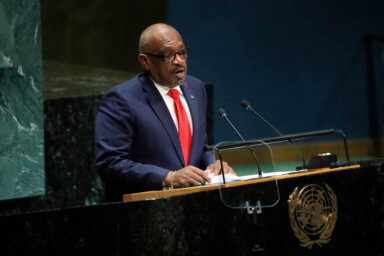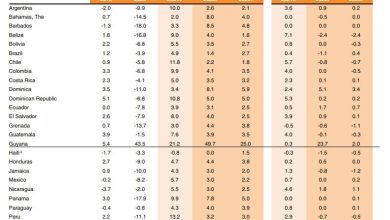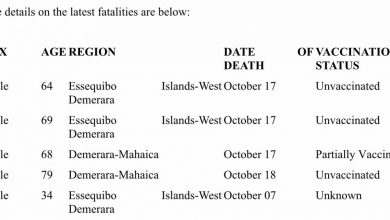Caribbean RoundUp

Barbados
The Barbados-based Caribbean Policy Development Centre (CPDC) is urging CARICOM countries to immediately rebuild their food system as a recent study highlighted the need for transformation, referring to the detrimental impact of unhealthy diets laden with fats, sugars and sodium on the region’s health.
“The supply of fats and oils, sugars and sweeteners, coupled with a lack of access to nutritious foods due to poverty and unemployment, has fueled an alarming rise in chronic non-communicable diseases (NCDs),” the study said.
It also said that the region’s food systems have been hindered by more than two decades of slow economic growth, severe issues of food insecurity and inequality.
They emphasized the need for reshaping food systems and policy frameworks to prioritize food and nutrition security and sovereignty.
“While the concept of food sovereignty has yet to gain widespread traction in CARICOM countries, grassroots organizations, farmers’ networks and regional initiatives are championing local food production and sustainable farming practices.
“Advancing the food sovereignty agenda requires robust leadership from non-governmental organizations and civil society organizations, with the CPDC identified as a key player in this endeavor,” they recommended.
The study also emphasize on the importance of regional and international policy interventions in supporting national development-oriented programs.
It also found that small and medium-scale food producers faced significant challenges, including droughts, pests and post-harvest losses and that key requirements including training, resources, marketing support and farm management skills were needed.
Caribbean
A US$5.3 million investment has been made in eight CARICOM states to promote sustainable agricultural development and enhance food security in the region.
Permanent Secretary in the Trinidad and Tobago’s Ministry of Agriculture, Javed Ali made the announcement at the opening of a workshop on enhancement of extension services at the UWI St. Augustine campus last week.
The three-year investment comes from Improving Economies for Stronger Communities (IESC), the US Agency for International Development (USAID) and the Caribbean Agricultural Productivity Improvement Activity (CAPA).
The programme aims to improve farmers technical capacity by integrating good agricultural practices through extension services.
IESC, through the Inter-American Institute for Co-operation Agriculture (ICA) expects to address the strengthening of these extension services.
IICA delegate Diana Francis said, “Extension services were an essential fixture from the days of plantation agriculture.”
“In this new and rapidly changing environment, which is technologically, digitally and dominated by artificial intelligence, extension service transformation can no longer afford to lag behind.
“Farmers, who are the ultimate users and doers of the information-knowledge transfer, must have a central role.”
Ali described extension services as the “life- line” of agricultural innovation and farmer support, and added that the program was crucial in enabling farmers to prosper in a competitive global market.
CAPA Program Director Saniford Edwards emphasized the need for enhanced agriculture stakeholder knowledge and capacity through ongoing collaboration with regional universities.
Grenada
The International Monetary Fund (IMF) said Grenada’s economy is experiencing “sustained, strong growth” projecting a growth of 3.9 percent this year which is supported by a positive tourism sector.
The IMF also said that a surge in the Citizenship by Investment (CBI) where foreign investors are granted Grenadian citizenship in return for making a substantial investment in the socio-economic development of the country, revenue has resulted in a large budget surplus, an increase in government deposits, and lower public debt.
The IMF said the key fiscal policy priorities are to improve the management of these potentially unstable CBI revenues, contain the growth of recurrent expenditures and strengthen public financial management.
There are calls for better data collection, greater supervisory oversight, and regional supervisory cooperation due to rising risks in the non-bank financial system.
“Reducing Grenada’s dependency on imported fossil fuels, boosting competitiveness, and investing in climate resilience are essential to increase long-term growth,” it added.
The IMF said that Grenada’s economy is estimated to have expanded by 4.4 percent last year and inflation declined to 2.2 per cent at the end of last year as food and fuel price pressures eased.
The IMF said growth is projected to decelerate in the coming years as capacity constraints weigh on tourism growth and investment.
It said the economy is projected to grow 3.9 percent this year.
Guyana
The Guyana Teachers Union (GTU) are encouraging teachers to return to their jobs on the last day of the current term and on the first day of the new term in September, to prevent them from being taken off pay sheets.
“The precedence would have already been set that if you are not there the last and the first day that your names are most times taken off of the pay sheet and your salaries withheld,” GTU Vice President, Collis Nicholson told teachers recently.
The union has indicated that another round of High Court action could be taken to force the labor minister to send the pay dispute to resolution. At the meeting, a number of teachers recommended that they return to school a few days of the last week of this term to prepare for the start of the new school year, in keeping with the Education Ministry’ rules.
Another related option was the signing of a terms of resumption without any payments such as a 20 percent interim salary increase, cash grant or the reinstatement of the union dues but with 21 days of conciliation in July through the chief labor officer.
They are also considering a push for arbitration within 14 days in July and August, failing which strike action would resume at the start of the new school year.
The GTU wants Minister of Labour, Joseph Hamilton to order an arbitration into the current dispute involving the teachers, saying that he has been advised that the High Court could order him to do so.
Haiti
A team of Haitian police commanders recently met Kenya’s inspector general of police ahead of a planned deployment in Haiti that is expected to take place by the end of June.
Kenya is set to lead a UN backed multinational peace-keeping mission with officers from several countries to battle gang violence in Haiti that has left thousands of people dead and forced many others to flee their homes.
“We are counting on your support,” Haitian Police official Joachim Prohete told Kenya’s Inspector Japhet Koome in a meeting in Nairobi, as police clashed with anti-taxation protesters in the streets.
“We are ready and committed to come over and assist whenever needed,” Koome told the Haitian delegation in return.
The Haitian police also met commanders of the 1,000 Kenyan officers who will be deployed in the mission.
President William Ruto last week said Kenya will honor its commitment to restore peace in the Caribbean nation.
St. Kitts and Nevis
Prime Minister Dr. Terrance Drew defended the decision to establish the Citizenship by Investment (CBI) Unit (CIU) as a corporate body as his administration continue to implement the necessary measures that will prove to its international partners that the twin-island Federation is resolute in efforts to strengthen the CBI program.
The government has also secured parliamentary approval for the establishment and operationalization of the continuing international due diligence (CIDD) Unit, as part of the efforts to further protecting the country’s reputation internationally.
“We are serious and we want to ensure that we engender confidence in our international partners that we are serious about their security as well,” said Prime Minister Drew.
Under the CBI program, foreign investors are granted citizenship of St. Kitts and Nevis in return for making a substantial investment in the socio-economic development of the Federation.
Parliament has given the indication to the Citizenship by Investment Unit Bill, 2024, effectively paving the way for the CIU to be a corporate body that the government maintains is in line with best international practices.
Prime Minister Drew, who is also responsible for Citizenship and Immigration, in what he termed “glaring instances of mismanagement” of the CBI program under the previous administration that he said raised concerns internationally.
The CIU presently operates as a department within the Ministry of National Security, Immigration and Citizenship with financial oversight by the Prime Minister’s Office.
A government statement said as a result of the parliamentary approval of the legislation, the CIU will now stand as a statutory corporation, having perpetual succession and a common seal and may sue and be sued in its corporate name.
— Compiled by Devika Ragoonanan




